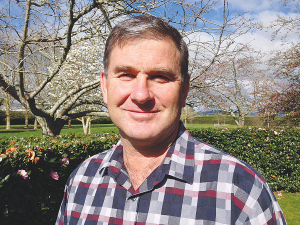Alliance commissions major heat pump system at Mataura, cutting coal use and emissions
Alliance Group has commissioned a new heat pump system at its Mataura processing plant in Southland.
 Waikato dairy farmer Garry Reymer says no one has yet been able to monetise GHG reductions to the farmer.
Waikato dairy farmer Garry Reymer says no one has yet been able to monetise GHG reductions to the farmer.
A Fonterra shareholder says he doubts that consumers around the globe are clamouring for products with a low carbon footprint.
Garry Reymer, Cambridge, claims some of the co-operative's major customers are seeking to piggyback on Fonterra farmers' low carbon footprint to meet their politically driven environmental obligations.
Reymer, Waikato Federated Farmers dairy chair, says consumers of Fonterra products "just want a safe food that is high in protein at a good price".
"We should not confuse consumers with customers," he told Rural News.
Reymer's comments come as Fonterra prepares to unveil scope 3 targets - for farmers to reduce their greenhouse gas emissions behind the farm gate.
The co-op is warning that failure to tackle scope 3 emissions will lead to major customers and consumers walking away, and even embracing plant-based products.
Reymer says some of Fonterra's customers in the Northern Hemisphere and the European Union are pushing a climate change agenda.
"Most of the greenhouse gas demand is government to government or government to business or B2B, but very rarely demanded by the consumer," he says.
He says this was highlighted by a presentation at the recent Rabobank Farm2Fork conference in Sydney, where a cotton producer from South Australia went to London to canvas how much more consumers would pay for sustainably produced cotton chinos over standard products.
"The answer came back 10 pounds - certainly not enough to cover the extra cost to produce," Reymer says. "Most of our dairy exports go to the low value markets that Europe doesn't want to or need to supply."
He adds, if NZ needs to comply with European demands, we should be able to compete in their market so we can try to capture some value for our farmers.
"Everybody wants an organic or sustainabl produced product until they get to the checkout counter then they just want cheap - except for a privileged few."
Reymer says no one has yet been able to monetise GHG reductions to the farmer.
"It will only add cost."
He says farmers are waiting to hear Fonterra's plans on scope 3 emissions. "My pick is they will not be able to add value to my bottom line. The same goes for banks and other industries that service farmers," Reymer adds.
"Why you may ask has a bank not come out and said, 'if your GHG emisions are 'x' you will pay this rate of interest and if it is 'y', you pay another'.
"But now they want us to reduce emissions at our cost to meet their scope 3 targets, so that they can say to the Government that they are going fine, but the producer's margin is eroded."
Legal controls on the movement of fruits and vegetables are now in place in Auckland’s Mt Roskill suburb, says Biosecurity New Zealand Commissioner North Mike Inglis.
Arable growers worried that some weeds in their crops may have developed herbicide resistance can now get the suspected plants tested for free.
Fruit growers and exporters are worried following the discovery of a male Queensland fruit fly in Auckland this week.
Dairy prices have jumped in the overnight Global Dairy Trade (GDT) auction, breaking a five-month negative streak.
Alliance Group chief executive Willie Wiese is leaving the company after three years in the role.
A booklet produced in 2025 by the Rotoiti 15 trust, Department of Conservation and Scion – now part of the Bioeconomy Science Institute – aims to help people identify insect pests and diseases.